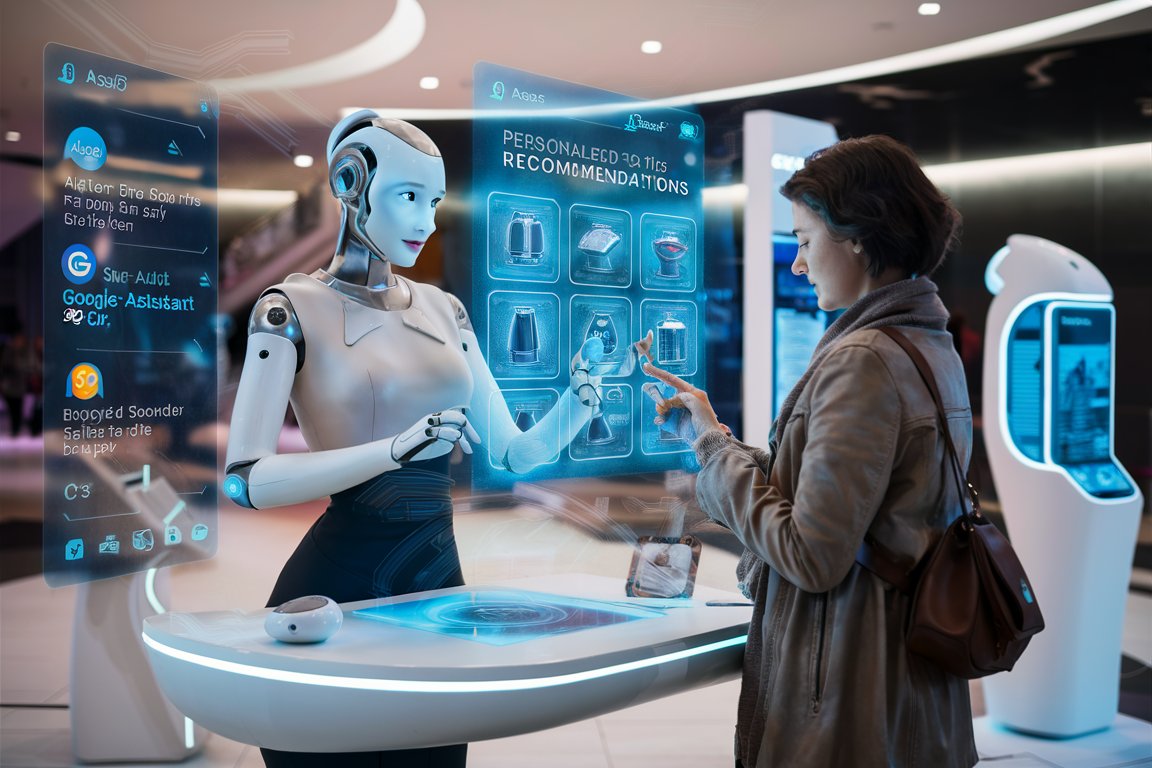
In today’s digital age, artificial intelligence (AI) is revolutionizing the way we shop. From personalized recommendations to streamlined checkout processes, AI-powered shopping assistants are reshaping the retail landscape.
“Discover the Future of Shopping: AI as Your Personal Assistant.”
In this post, we’ll explore how AI can enhance your shopping experience, the challenges it presents, and what the future holds for this transformative technology.
Introduction to AI in Shopping
Artificial intelligence, or AI, refers to the simulation of human intelligence in machines that are programmed to think like humans and mimic their actions.
In the realm of shopping, AI is utilized to analyze vast amounts of data to understand consumer preferences and behaviors, ultimately improving the shopping journey.
Benefits of AI as a Shopping Assistant
Personalization: AI excels in delivering personalized shopping experiences by analyzing past purchases, browsing history, and demographic data. This enables AI assistants to suggest products tailored to individual tastes and preferences, making the shopping experience more efficient and enjoyable.
Time-saving: One of the most significant advantages of AI in shopping is its ability to save time. AI can quickly sift through product options, compare prices across different retailers, and even automate the checkout process, allowing consumers to make informed decisions swiftly.
Decision-making support: AI-powered assistants provide valuable recommendations and insights based on data analysis. Whether it’s suggesting complementary products or alerting shoppers to discounts on their favorite items, AI enhances decision-making by presenting relevant information in real-time.
Examples of AI Shopping Assistants
Several prominent AI-powered shopping assistants have already made their mark in the market.
For instance, Amazon’s Alexa and Google Assistant not only assist with voice-activated shopping but also provide personalized recommendations based on user interactions and preferences.
Challenges and Concerns
While AI brings numerous benefits to the shopping experience, it’s not without its challenges and concerns:
Privacy and data security: Consumers are rightfully concerned about how AI handles their personal data. It’s crucial for retailers to prioritize data protection and transparency in AI-driven interactions to build trust with their customers.
Accuracy and reliability: AI algorithms may sometimes struggle to fully grasp complex consumer preferences or context-specific needs. Continual refinement and user feedback are essential to improve the accuracy and reliability of AI recommendations.
User acceptance: Despite advancements, some consumers may still be hesitant to fully trust AI recommendations. Educating users about the benefits and limitations of AI, along with providing options for manual control, can help alleviate these concerns.
Future Trends
The future of AI in shopping looks promising, with advancements in:
Voice assistants: Voice-activated AI assistants are becoming more intuitive and capable of handling complex shopping tasks, such as placing orders and tracking deliveries.
Augmented reality (AR): AR technologies allow consumers to visualize products in real-world environments before making a purchase, enhancing the online shopping experience.
Predictive analytics: AI’s ability to predict consumer behavior and trends will continue to evolve, enabling retailers to anticipate demand and optimize inventory management.
Impact on Retailers and Consumers
AI is not only transforming how consumers shop but also how retailers operate:
Enhanced customer insights: Retailers can gain deeper insights into consumer behavior through AI-powered analytics, enabling them to tailor marketing strategies and inventory management more effectively.
Competitive advantage: Adopting AI can give retailers a competitive edge by improving operational efficiency, reducing costs, and enhancing customer satisfaction.
Ethical Considerations
As AI continues to evolve, addressing ethical considerations is crucial:
Fairness in recommendations: Ensuring AI algorithms are unbiased and fair in their recommendations is essential to avoid reinforcing stereotypes or promoting discriminatory practices.
Transparency: Providing transparency in how AI algorithms operate and use consumer data fosters trust and accountability.
Tips for Consumers
To make the most of AI shopping assistants while safeguarding privacy:
- Review privacy policies and opt for retailers that prioritize data security.
- Regularly update privacy settings and permissions for AI-enabled devices.
- Provide feedback to retailers on AI recommendations to improve accuracy over time.
Join FREE 10 Classes by Wealthy Affiliate!
Learn how to make money online with affiliate marketing for your business, including AI-driven Personal Shopping Assistants.
Top AI Tools Transforming Your Shopping Experience
Here’s a list of some top AI tools and platforms that serve as personal shopping assistants:
- Amazon Alexa: Alexa is Amazon’s voice-controlled assistant that can help users with shopping tasks, such as placing orders, reordering items, and providing product recommendations based on previous purchases.
- Google Assistant: Google Assistant provides personalized shopping recommendations and can assist with shopping tasks through voice commands on various devices, including smartphones and smart speakers.
- Siri (Apple): Siri, Apple’s virtual assistant, offers shopping assistance through voice commands on iOS devices. It can provide product recommendations, check prices, and facilitate online shopping.
- IBM Watson: Watson is IBM’s AI platform that offers personalized shopping experiences by analyzing customer data and preferences. It can assist retailers in providing targeted recommendations and optimizing inventory management.
- Chatbots (Various Providers): Many retailers and brands deploy AI-powered chatbots on their websites and messaging platforms. These chatbots use natural language processing (NLP) to understand customer queries and provide personalized shopping assistance in real-time.
- Cortexica Visual AI: Cortexica provides visual search and image recognition capabilities, allowing users to find products similar to ones they’ve seen or liked. This technology enhances the visual shopping experience by identifying items based on images.
- Lyst: Lyst utilizes AI to curate personalized fashion recommendations for users based on their browsing history and preferences. It helps users discover new styles and trends aligned with their fashion tastes.
- Stitch Fix: Stitch Fix combines AI algorithms with human stylists to offer personalized clothing recommendations. It analyzes customer data to understand style preferences and sends curated clothing items directly to customers.
- Pinterest Lens: Pinterest’s visual search tool, Lens, uses AI to help users discover products by taking photos or scanning images. It provides recommendations based on visual similarities and trends.
- Rakuten Slice: Rakuten Slice uses AI to track online purchases and analyze shopping patterns. It provides personalized recommendations, alerts users to price drops on items they are interested in, and helps manage online orders.
These AI tools and platforms demonstrate how artificial intelligence is transforming the shopping experience by offering personalized recommendations, streamlining the purchasing process, and enhancing customer engagement through innovative technologies.
Clicke here to read more “How To Your AI in Your Business“.
In conclusion, AI-powered shopping assistants represent a significant advancement in retail technology, offering personalized experiences, efficiency gains, and predictive insights.
While challenges like privacy concerns and algorithm accuracy exist, ongoing innovation and consumer education will drive the responsible adoption of AI in shopping.
Embrace the possibilities of AI as your personal shopping assistant and stay informed about its evolving capabilities to enhance your shopping journey.
Q&A
Q: What exactly can an AI-powered personal shopping assistant do for me?
A: An AI-powered personal shopping assistant can help you discover products based on your preferences, budget, and past purchases. It can also provide recommendations, compare prices, track deliveries, and even suggest complementary items.
Q: How does the AI know what products to recommend?
A: The AI analyzes your shopping history, preferences (which you provide or it learns over time), and sometimes current trends to suggest products that align with your interests and needs.
Q: Can an AI shopping assistant help me find the best deals?
A: Yes, AI tools can scan multiple retailers and websites to find the best prices for products you’re interested in, potentially saving you time and money.
Q: Is my personal information safe when using an AI shopping assistant?
A: Most reputable AI tools prioritize user privacy and employ encryption and other security measures to protect your personal information. It’s important to choose tools from trusted providers and review their privacy policies.
Q: How accurate are the product recommendations from AI shopping assistants?
A: The accuracy of recommendations can vary based on the quality of the AI algorithm and the amount of data it has about your preferences. Over time, as it learns more about your shopping habits, recommendations tend to become more accurate.
Q: Can an AI shopping assistant handle returns or exchanges for me?
A: Some AI tools offer features to assist with returns or exchanges by guiding you through the process or providing customer support contact information. However, policies vary by retailer and platform.
Q: How do I integrate an AI shopping assistant into my daily routine?
A: You can typically access AI shopping assistants through apps on your smartphone, dedicated websites, or even voice-activated devices like smart speakers. Set preferences and permissions, and the assistant can start providing suggestions immediately.
Q: Can an AI shopping assistant assist me with gift shopping?
A: Yes, AI shopping assistants can suggest gift ideas based on the recipient’s interests and preferences, making it easier to find thoughtful presents.
Q: Are there any limitations to using an AI shopping assistant?
A: While AI shopping assistants are powerful tools, they may not always understand nuanced preferences or the context behind specific shopping decisions. Additionally, they rely on available data and may not be aware of every niche product or retailer.
Q: How can I provide feedback to improve the AI shopping assistant’s recommendations?
A: Many AI tools allow users to rate suggested products or provide feedback directly within the app or website. This feedback helps refine future recommendations and improve the overall shopping experience.


